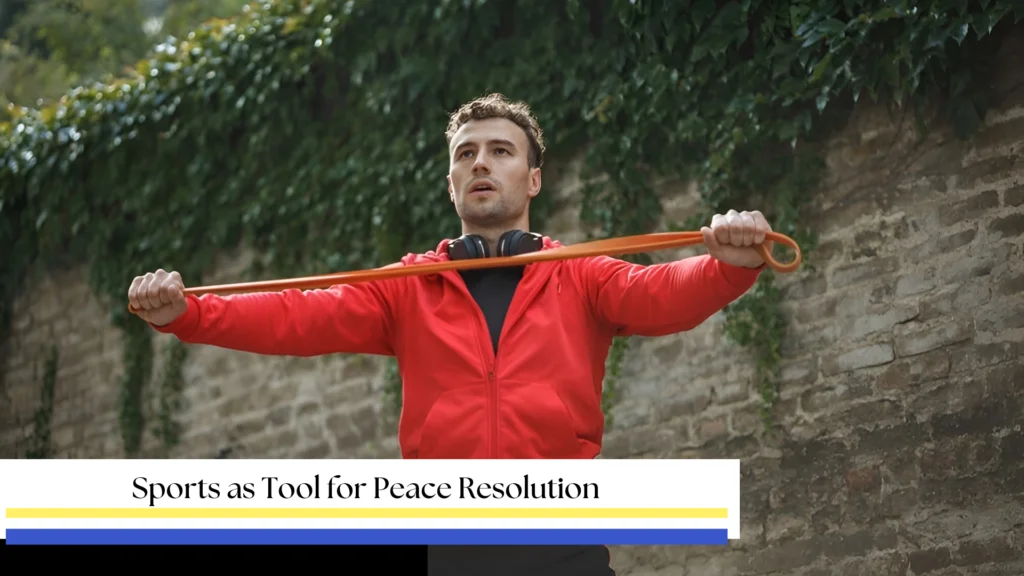Sports as Tool for Peace. George Bernard Shaw, the Irish playwright and Nobel Prize winner for literature, who died in 1950, credited with saying that sport does not contribute to international understanding, but rather “increases the fierce hatred between nations and sows discord even among those peoples who otherwise have no natural reason to quarrel.” Nelson Mandela, the South African President and Nobel Peace Prize winner, who died in 2013, contradicted the unifying power of sport, stating: “Sport has the power to change the world. It has the power to inspire.
And just as sport can contribute to peacemaking and international understanding, it can also intensify differences and political conflicts. Sport easily becomes a projection space and a punitive force for social and political processes. At the same time, however, it also has the stubbornness, the cultural residue in the form of a central nexus of values and structures, which must made hard against a club name. Interactions between sport and politics already existed in antiquity. In addition to their sporting and religious components, the ancient Olympic Games in Greece also had a very strong political dimension, for example, as a test of strength between the individual Greek city-states.
Sports as Tool for Peace: Interactions Between Sport and Politics as a Historical Driving Force

The founding of the International Olympic Committee (IOC) in 1894 also influenced by the international peace movement of the time. Before the modern Olympic Games came into being, the French pedagogue, historian, and sports administrator Baron Pierre de Coubertin (1863–1937) called them the Olympic Games. He concerned himself with the opportunity to bring the nations entangled in wars into unison in the revival of ancient Olympic Games and, through them, to create a place for international understanding.
Sports as Tool for Peace. Linking sporting competition with the “ideal superstructure” of Olympic values, Coubertin made a significant contribution to the growing politicization of sports. The plan developed in 1894 for the introduction of the modern Olympic Games, not only to committed to medals and records, but also to the ideal of Olympism and Olympic values such as friendship and respect, however, constantly overturned by the political environment from the very beginning. In 19th-century Germany, gymnastics clubs the scene of political exchanges, where demands for national unification and democratization negotiated.
Sports as Tool for Peace: The 1936 Olympic Games

The collapse of the Weimar Republic and the Nazi seizure of power brought about a clear disruption in German sports structures. Sports associations dependent on social milieus and party-political movements eliminated either immediately or entirely. From then on, they replaced by organizations rooted in Nazi ideology. At the same time, the National Socialists used sport for political purposes more than any other state power before it: The IOC’s decision to commission Germany to host the 1936 Winter and Summer Olympic Games in Garmisch-Partenkirchen and Berlin made during the Weimar Republic.
The National Socialists seized the opportunity, after initial rejection of the Olympic idea, to present a cosmopolitan and peace-loving Germany, above all however a modern and efficient regime. To this end, they increased the basic Weimar budget from six to approximately 100 million Reichsmarks, commissioned the construction of a new large stadium, and created entirely new formats for the media presentation and communication of sports. The Olympic torch relay idea, which, however, had already conceived by a Jewish archaeologist in 1931, serves as an obvious example.
Sports as Tool for Peace: Political System Competition in Elite Sport

If the Nazi regime had politically appropriated the Olympic Games to its ends, then the temporary suspension of Germany after the Second World War was a political communication of the IOC. There were numerous suspensions during the history of the Olympic Movement, but longer-term banishments were an exception. Yet here, too, voluntary restrictions repeatedly repeated, such as those of the Soviet Union, which began holding Spartakiads [in honor of the ancient insurgent leader Spartacus editor’s note] as early as 1928. Ed.] as independent international competitions and did not participate in the Olympic Games from 1928 to 1952.
Germany, considering its participation in initiating World War I, already not invited to the Summer Olympics of 1920 and 1924 a step that repeated itself in London in 1948. There was no expulsion, however, at the inaugural session of the International Olympic Committee following World War II of German members because the former had co-opted (= elected as individual members with subsequent membership to an existing body through reelection). The German Football Association officially suspended at the FIFA Congress held in Luxembourg in 1946, after the German Reich had not played any international matches since the end of 1942. The 1950 World Cup took place in the summer.
Conclusion

The Federal Republic was not admitted to FIFA until September of that year. Although the triumph of the 1954 World Cup has retrospectively been described as the second founding act of the Federal Republic with an intense identity-forming effect, there was initially no political incitement to the event dubbed the “Miracle of Bern. German sports, whose associations were strongly influenced by Allied ideas in the post-war period, presented themselves as ideologically and religiously neutral. The creation of the German Sports Federation (DSB), a common national umbrella organization, represented a significant organizational innovation in German sports self-government.
German-German sports relations during the Cold War were completely subordinate to German politics and simultaneously characterized by interdependence and separation. Although two German states existed from 1949 onwards, West German and East German athletes formed a united German Olympic team at the Summer and Winter Games a total of six times between 1956 and 1964; however, separate medal counts began in 1968. For the GDR, the united German team offered the only possibility for Olympic participation, because initially only the West German “National Olympic Committee for Germany” was fully recognized by the IOC.



